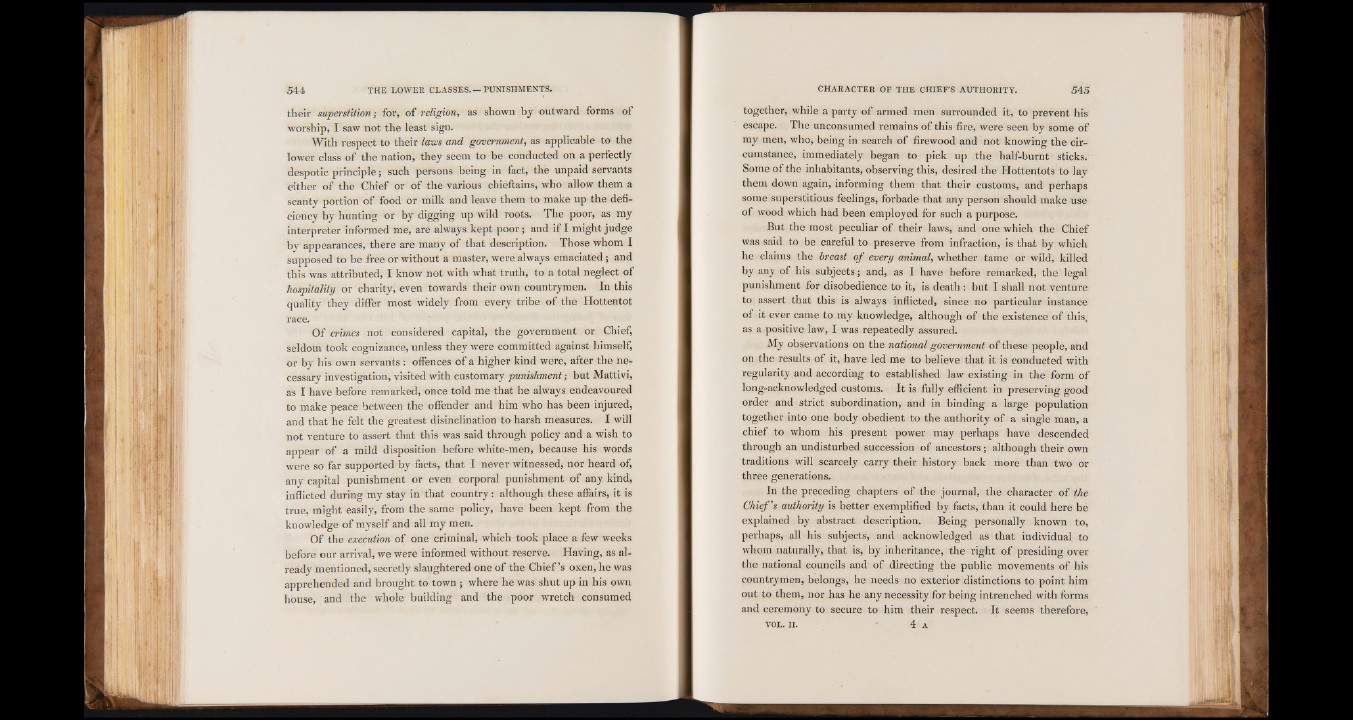
their superstition; for, of religion, as shown by outward forms of
worship, I saw not the least sign.
With respect to their laws and government, as applicable to the
lower class of the nation, they seem to be conducted on a perfectly
despotic principle; such persons being in fact, the unpaid servants
either of the Chief or of the various chieftains, who allow them a
scanty portion of food or milk and leave them to make up the deficiency
by hunting or by digging up wild roots. The poor, as my
interpreter informed me, are always kept poor; and if I might judge
by appearances, there are many of that description. Those whom I
supposed to be free or without a master, were always emaciated; and
this was attributed, I know not with what truth, to a total neglect of
hospitality or charity, even towards their own countrymen. In this
quality they differ most widely from every tribe of the Hottentot
race.
Of crimes not considered capital, the government or Chief,
seldom took cognizance, unless they were committed against himself,
or by his own servants : offences of a higher kind were, after the necessary
investigation, visited with customary punishment; but Mattivi,
as I have before remarked, once told me that he always endeavoured
to make peace between the offender and him who has been injured,
and that he felt the greatest disinclination to harsh measures. I will
not venture to assert that this was said through policy and a wish to
appear of a mild disposition before white-men, because his words
were so far supported by facts, that I never witnessed, nor heard of,
any capital punishment or even corporal punishment of any kind,
inflicted during my stay in that country: although these affairs, it is
true, might easily, from the same policy, have been kept from the
knowledge of myself and all my men.
Of the execution of one criminal, which took place a few weeks
before our arrival, we were informed without reserve. Having, as already
mentioned, secretly slaughtered one of the Chief’s oxen, he was
apprehended and brought to town ; where he was shut up in his own
house, and the whole building and the poor wretch consumed
together, while a party of armed men surrounded it, to prevent his
escape. The unconsumed remains of this fire, were seen by some of
my men, who, being in search of firewood and not knowing the circumstance,
immediately began to pick up the half-burnt sticks.
Some of the inhabitants, observing this, desired the Hottentots to lay
them down again, informing them that their customs, and perhaps
some superstitious feelings, forbade that any person should make use
of wood which had been employed for such a purpose.
But the most peculiar of their laws, and one which the Chief
was said to be careful to preserve from infraction, is that by which
he claims the breast of every animal, whether tame or wild, killed
by any of his subjects; and, as I have before remarked, the legal
punishment for disobedience to it, is death : but I shall not venture
to assert that this is always inflicted, since no particular instance
of it ever came to my knowledge, although of the existence of this,
as a positive law, I was repeatedly assured.
My observations on the national government of these people, and
on the results of it, have led me to believe that it is conducted with
regularity and according to established law existing in the form of
long-acknowledged customs. It is fully efficient in preserving good
order and strict subordination, and in binding a large population
together into one body obedient to the authority of a single man, a
chief to whom his present power may perhaps have descended
through an undisturbed succession of ancestors; although their own
traditions will scarcely carry their history back more than two or
three generations.
In the preceding chapters of the journal, the character of the
Chief's authority is better exemplified by facts, than it could here be
explained by abstract description. Being personally known to,
perhaps, all his subjects, and acknowledged as that individual to
whom naturally, that is, by inheritance, the right of presiding over
the national councils and of directing the public movements of his
countrymen, belongs, he needs no exterior distinctions to point him
out to them, nor has he any necessity for being intrenched with forms
and ceremony to secure to him their respect. It seems therefore,
vol. H - 4 a